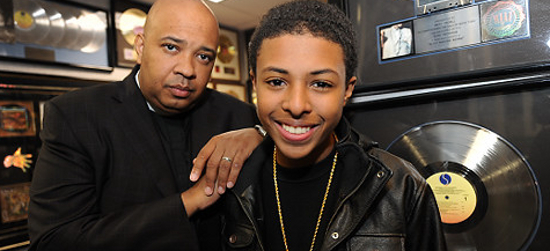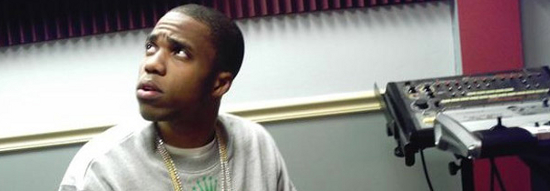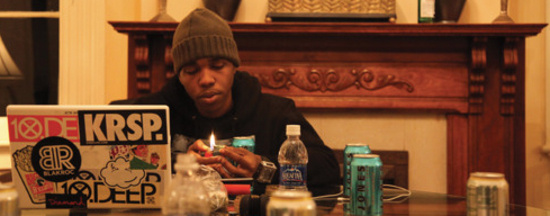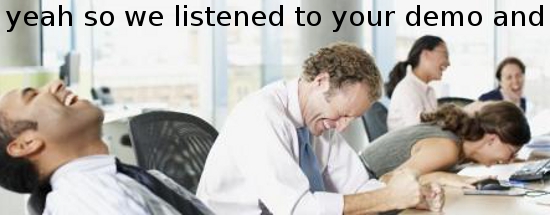Nobody is Going to Put You On
Posted by Justin Boland on Apr 22, 2011 | 0 Comments

Reader question: “Do you think A&R’s are important, and how does a new artist send in his stuff or get looked at?”
Quick Answer: Fuck no and don’t bother.
Not being funny or even sarcastic: no label is investing in artist development and nobody in A&R cares about you until you’re making serious waves already, on your own, and building a track record of proven profitability. The long answer is more interesting than that, though…
A&R in 2011: The Atlantic Model
In 2011, the A&R department is doing placement and licensing, not artist development. They have serious business goals every day and they rely on a proven team of hit-makers — they’re not in the business of putting on new talent. One of the best articles on the music business in 2011 so far was this: Atlantic, the Record Label that Has it All Figured Out. David D. lays out their marketing model in clinical & cynical detail:
“…the label starts a search, screening possible crossover hits with already-finished hooks from soft R&B artists backed by xylophones and synths. Perhaps the label even shops the skeletal track to movies looking for songs for its preview. Or they pitch it towards TV shows looking for a track to play during the dramatic monologue of the pilot episode before the rapper even lays a vocal down. Once Sponsor A bites, the label zips the song to the rapper and demands that he made the track his next single regardless of how it gibes with the rest of his album or his library to date. F*ck his loyal fanbase. They don’t buy albums anyway.
The album, full of sponsorship-ready tunes, is released. The singles have already reached top spots on the charts and are in every commercial on television, so they’re primed to score hundreds of thousands of units in its first week. But even if it doesn’t, the label is swimming in extra revenue from the cross-promotions even if an artist didn’t sign a 360 deal.”
The sad story of Lupe Fiasco proves that David D. was dead-on — from an infamous Complex interview titled “Lupe Fiasco Hates His Own Album,” he describes exactly the same situation…
“That was the label’s record. That wasn’t like I knew the producer or knew the writer or anything like that. That was one of those records the record company gave me, they even gave me stuff they wanted me to rap about. It wasn’t like, ‘Hey I did this and I went to a mountain and found inspiration and it was this.’ … I was used to it because they presented me like ten other songs in the same fashion or via email. There was nothing special about it for me at that point.”
Fashawn: Profitable Independence

Weeks later, over at The Rap Up, when they asked Fashawn about Lupe’s position, he was just kinda baffled:
TRU: Without dropping names, you and I both know that a lot of rappers start out making dope music and, due to pressures from their label company, they completely change their style. Are you able to avoid those pressures or is it still a struggle to make the kind of music you want to make?
Fashawn: I’m not even on a label, period. Boy Meets World was the only time I ever had a record deal. And that was indie. I feel like I’m cut from a whole different cloth from the rest of these motha fuckas. But I can understand. I’ve been on a record label; I know the pressures. All these other artists man; God bless ‘em. I hope they succeed. They just making it easier for me to do my thing and make this real music.
TRU: Would you ever consider going the major/indie label route?
Fashawn: I’m just down with anybody that interests me, man. I’m more interested in a good roster rather than a major label that has a good machine. We really don’t need the industry’s help. I guess by default I didn’t go that route and it worked out for me, and now I’m 22 and that’s a blessing.
Curren$y: The Slow Burn

Curren$y represents a different breed of role model. He’s on Warner Brothers, but he’s signed on his own terms…as he puts it: “I don’t want to do anything. I don’t want to sit in anything. I just want to keep doing what I’m doing. And if anybody believes in that enough to write me a check for a million dollars, then let em go.” (He’s repeatedly said “understand that I’m not going to make the radio single,” a clear reference to the Atlantic model.)
The reason Curren$y has this kind of leverage with a major corporation has nothing to do with his rapping. When I talk to new artists, man, I cannot emphasize this shit enough: we are not participating in a talent show. You are involved in an actual business. Curren$y has a prolific, long-standing and proven business model where he makes money off mixtapes. Warner Brothers knows he will continue to do that, with or without them, but they want a piece of reliable income so they’re willing to negotiate differently.
He also put a lot of work into this approach…

Source: This awesome Metal Lungies interview:
ML: Was that slow burn something you did on purpose?
Curren$y: Yeah, because you want to be in it for a minute and anything that get big that fast, it pops like it’s a bubble. You start off small, you get super big, and then you’re no more. That’s just the nature of it anyway. I want this process to take longer. You hurry up and get to this, it’s over for you. So the slow burn is the better deal. You gotta come into this knowing that it’s not for you forever. There’s no way that you can do it. Motherfuckers are so in a rush to get here that they pop. You gotta stretch this time out and make this time the most enjoyable time. Right now, I’m living and loving it. It’s just the best shit in the world right now.
ML: Over this really slow burn, did you ever feel hopeless? Did you feel like the career was stagnant?
Curren$y: Nah, because it didn’t take long. I left Cash Money in 2007 and I was putting tapes out every month. I put one out — I pressed that one up physically. I pressed Independence Day up, because I hadn’t had a grasp of the blogs and shit and what I could really do, what could happen. So I just pressed up 3,000 copies myself and I sent some to a few stores I know in Miami and then I put out the second one and that’s when somebody sent me a link…
Playboy Tre: Doing the Work

Thanks to Zilla Rocca for passing me this gem from a recent interview on Passion of the Weiss with Dirty South entrepreneur Playboy Tre. You can see a world of difference between the average rapper talking about “hunger” and “grind” vs. the professional details and measurable goals that Playboy Tre is talking about here…
How do viral videos keep your name out there?
Playboy Tre: Doing the videos was important. We’re in the internet age now, you may as well call it the microwave age. We’re in a time where people want to see visuals, they want to see the whole story laid out for them. I had “Earline’s Son†when I put out the project and I thought that a lot of people had heard it. But once you have the video you realize. It’s a lot easier for people to click a link, they’ll watch a video before they download a project. People who are not really your fans or who aren’t interested in finding all the new music. We put out videos and people call me like, “Man, that’s a dope song, when did you do that?†And I’m like, “that song was released on a project a few months back and thought you heard itâ€. And these are people I see all the time! “Aw naw man, I just heard it on the video!†The one thing I do regret is, I wish I had videos during Goodbye America and Liquor Store Mascot. I think that would have helped and made the situation bigger in certain peoples’ eyes…
How else has building a fanbase changed with the internet? I know you tour like crazy with B.O.B. and solo.
Playboy Tre: You can build a fanbase online by posting songs, projects and videos and people will know who you are. But it’s still nothing like getting out and being physically able to touch the people. To get in front of people’s faces and have them see the way you dress, the way you talk, your mannerisms. I hate to use the word, but to see your swagger. To see what kind of person you are. To see if all the stuff you say in your music is matching up. You might think, you can read 100 blogs about yourself, it might be 50-60 pages in Google on a certain project and you might think the whole world knows who you are. And you going to do a show and nobody knows who the hell you are. And you like, “What the hell? I thought the whole world knows me!†There’s still a whole world out there. You need to get in front of them and let them know who you are. That’s still to me is the most solid way to gain a fanbase. Every time I get out and do a show by myself [versus] going out during B.O.B., I see an instant change in the amount of people that hit me up online. You’re definitely able to touch more people that way.
The Big Picture

You have the right to make bad decisions. If your goal is to get famous by any means necessary, don’t let my advice discourage you. Miracles happen every day, it’s always worth giving it a shot.
That said, the odds of your submission to an A&R department even getting opened before being thrown out are very, very slim.
My recommendation is to focus on building your own business — let labels come to you when you’ve got a strong foundation to negotiate from.
Here’s the best method to get noticed by a major label A&R: Do something so remarkable they hear about you from a bunch of other people, then google your shit. You can’t go wrong with timeless classics like that. Just focus on being awesome.
The rest is hard work, but at least it’s simple.


